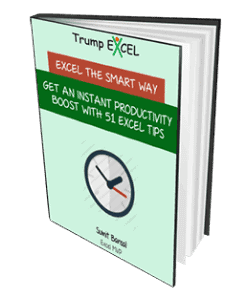Choosing the right fonts for your Excel spreadsheets can make a big difference in readability and visual appeal.
In this article, I will list the best fonts in Excel that you can try.
These are based on my personal experience of 15+ years of working with Excel spreadsheets (and other Microsoft Office applications)
This Tutorial Covers:
ToggleAptos Narrow – The New Default Font
Aptos Narrow is the new default font in Excel with Microsoft 365.

It is slightly narrower and less thick than Calibri (which was the old default font), but it still looks clean and professional.
This allows you to fit more data in a cell without sacrificing the readability.
To be honest, I initially did not like the Aptos Narrow font in Excel, but slowly, I’ve gotten used to it, and now I actually started liking it. It’s a great font for text as well as numbers.
Calibri – The Old Default Choice
Calibri is the default font in Excel (in versions before Excel with Microsoft 365) and other Microsoft Office applications.
Its modern, clean lines make it easy to read on screens.

Calibri is a sans-serif font, which means it doesn’t have the small lines at the ends of characters found in serif fonts. This helps in maintaining clarity and legibility.
The default size is typically 11 points, which provides good readability without being too large. If you’re working on general data entry or casual reports, Calibri is a reliable choice.
I feel Calibri also gives your Excel worksheets a clean and professional look. It’s the best font in Excel for numbers.
Verdana – Clear and Consistent
Verdana was designed with screen readability in mind. Its larger x-height and wider letter spacing make it one of the clearest fonts for digital use.

This sans-serif font ensures that your text remains legible even at smaller sizes, making it ideal for detailed spreadsheets.
Using Verdana helps maintain a consistent and professional look. Whether you’re viewing your spreadsheet on a computer or a printed sheet, Verdana’s clarity is hard to beat.
You can see that Verdana is a bigger font than the rest and is good for text, but it may not be as good for numbers (especially if you have a lot of them)
Outside of Microsoft Excel, Verdana is my favorite font for all applications, whether Microsoft Word or Outlook/Gmail.
Arial – The Versatile Font
Arial is a go-to font for many due to its versatility. It’s a sans-serif font, known for its crisp and clean appearance.

This legibility makes it suitable for various types of documents, from simple lists to detailed reports.
Arial is widely used not only in Excel but also in other formats, which ensures consistency and familiarity across different media.
Also read: How to Make Cells Bigger in Excel?
Segoe UI – Clarity in Display
Segoe UI, designed for Microsoft, ensures high readability on screens. This makes it an excellent choice for Excel spreadsheets that will be viewed mostly on monitors or digital devices.

The font’s smooth curves and even spacing enhance readability, making data easier to digest.
Whether you’re creating dashboards or detailed spreadsheets, Segoe UI’s clarity will help your information stand out.
Times New Roman
Times New Roman is one of the most recognizable serif fonts, originally designed for print.

Its traditional look brings an element of professionalism to your documents.
The serif details help guide the reader’s eye across the text, improving readability.
Even though Times New Roman is more common in word processing, it still holds its own in Excel.
It’s a good choice for formal documents or spreadsheets that require a touch of classic elegance.
Helvetica
Helvetica is widely praised for its simplicity and clarity. Often used in various professional settings, this sans-serif font offers a clean and modern appearance.

Helvetica’s neutral design makes it suitable for almost any type of document, ensuring that your information is clear and accessible.
Its usage extends beyond Excel, making it a popular choice in graphic design, advertising, and signage.
Helvetica’s straightforward nature keeps your spreadsheet looking clean and professional.
While I don’t prefer using Comic Sans, I have been told that many people with dyslexia prefer using it as it makes it easier to read. Other Dyslexic friendly fonts include Opendys and Open Dyslexic
Also read: Change the Default Font in Excel
Useful Tips When Choosing the Right Font For Excel
- Avoid decorative fonts like Comic Sans MS, which can be distracting and hard to read.
- A font size of 10-12 points is ideal for regular text, while larger sizes are better for headings. Be cautious with stylizations like bold and italic. While they can emphasize important points, overusing them can clutter your spreadsheet and reduce readability.
- When working with financial models in Excel, consistency and clarity are key.
- When working with financial models in Excel, consistency and clarity are key. It’s better to stick with a default font such as Aptos Narrow or Calibri.
In this article, I covered the best Excel fonts you can use in your day-to-day work. I hope you found this article helpful.
Other Excel articles you may also like:




2 thoughts on “Best Fonts for Excel”
Hello,
I use Opendys and luciole as fonts.
Opendys is for dyslexics like me.
Luciole makes the text easier to read.
i was using verdana before.
Thanks for the suggestion Miaousse. I have Opendys and some other dyslexia friendly fonts in the article.